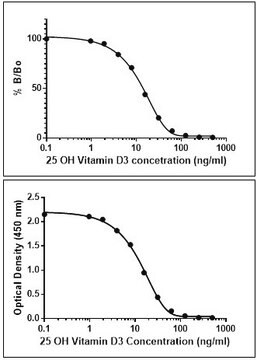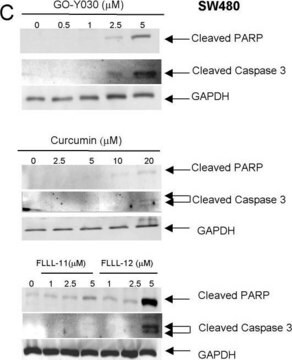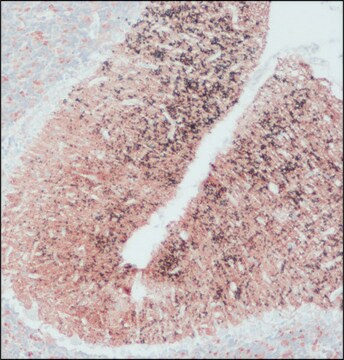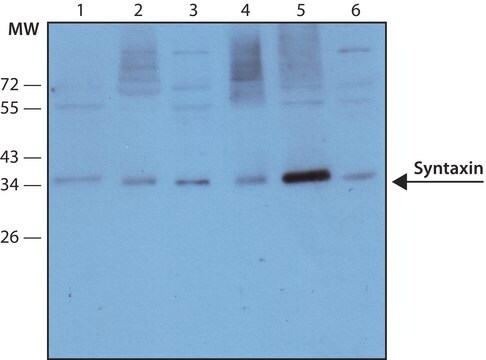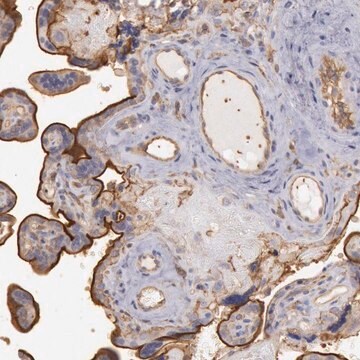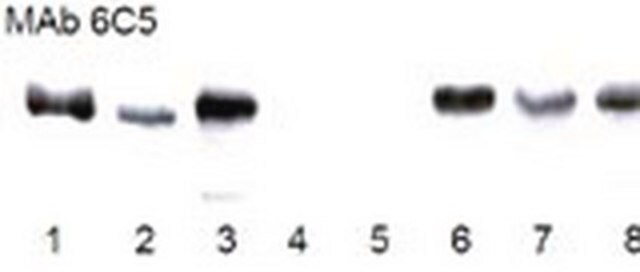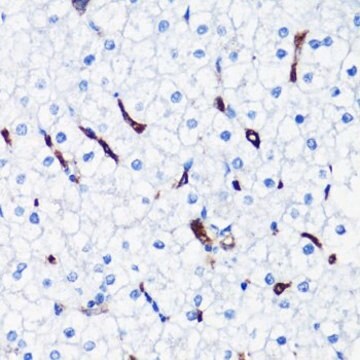MAB333
Anti-Synaptobrevin Antibody, clone SP10
ascites fluid, clone SP10, Chemicon®
Synonym(s):
VAMP
Sign Into View Organizational & Contract Pricing
All Photos(1)
About This Item
UNSPSC Code:
12352203
eCl@ss:
32160702
NACRES:
NA.41
Recommended Products
biological source
mouse
Quality Level
antibody form
ascites fluid
antibody product type
primary antibodies
clone
SP10, monoclonal
species reactivity
rat, hamster, salamander, pig, human
manufacturer/tradename
Chemicon®
technique(s)
immunohistochemistry: suitable
western blot: suitable
isotype
IgM
NCBI accession no.
UniProt accession no.
shipped in
wet ice
target post-translational modification
unmodified
Gene Information
human ... VAMP1(6843)
Specificity
Synaptobrevin [VAMP]. MAB333 reacts with VAMP-1 and VAMP-2 fusion protein expressed in bacterial system.
Immunogen
Crude synaptic immunoprecipitate (Human).
Application
Anti-Synaptobrevin Antibody, clone SP10 is an antibody against Synaptobrevin for use in WB, IH.
Immunohistochemistry at >1:25.
Western blotting at 1:100-1:10,000.
Optimal working dilutions must be determined by the end user.
Western blotting at 1:100-1:10,000.
Optimal working dilutions must be determined by the end user.
Research Category
Neuroscience
Neuroscience
Research Sub Category
Synapse & Synaptic Biology
Synapse & Synaptic Biology
Linkage
Replaces: AB5863P
Physical form
Liquid, contains sodium azide.
Storage and Stability
Maintain frozen at -20°C in undiluted aliquots for up to 12 months. Avoid repeated freeze/thaw cycles.
Legal Information
CHEMICON is a registered trademark of Merck KGaA, Darmstadt, Germany
Disclaimer
Unless otherwise stated in our catalog or other company documentation accompanying the product(s), our products are intended for research use only and are not to be used for any other purpose, which includes but is not limited to, unauthorized commercial uses, in vitro diagnostic uses, ex vivo or in vivo therapeutic uses or any type of consumption or application to humans or animals.
Not finding the right product?
Try our Product Selector Tool.
Storage Class Code
10 - Combustible liquids
Certificates of Analysis (COA)
Search for Certificates of Analysis (COA) by entering the products Lot/Batch Number. Lot and Batch Numbers can be found on a product’s label following the words ‘Lot’ or ‘Batch’.
Already Own This Product?
Find documentation for the products that you have recently purchased in the Document Library.
S E Bradford et al.
Neuroscience, 128(4), 751-765 (2004-10-07)
Certain excitatory pathways in the rat hippocampus can release aspartate along with glutamate. This study utilized rat hippocampal synaptosomes to characterize the mechanism of aspartate release and to compare it with glutamate release. Releases of aspartate and glutamate from the
G Bonanno et al.
British journal of pharmacology, 129(8), 1780-1786 (2000-04-26)
The release of [(3)H]-dopamine ([(3)H]-DA) from human neocortex nerve terminals was studied in synaptosomes prepared from brain specimens removed in neurosurgery and exposed during superfusion to different releasing stimuli. Treatment with 15 mM KCl, 100 microM 4-aminopyridine, 1 microM ionomycin
D M Sherry et al.
The Journal of comparative neurology, 431(4), 424-436 (2001-02-27)
Vesicle associated membrane protein (VAMP; also known as synaptobrevin) is a key component of the core complex needed for docking and fusion of synaptic vesicles with the presynaptic plasma membrane. Recent work indicates that the precise complement of presynaptic proteins
Peter Nagele et al.
Anesthesiology, 103(4), 768-778 (2005-09-30)
Volatile general anesthetics (VAs) have a number of synaptic actions, one of which is to inhibit excitatory neurotransmitter release; however, no presynaptic VA binding proteins have been identified. Genetic data in Caenorhabditis elegans have led to the hypothesis that a
S E Ahmari et al.
Nature neuroscience, 3(5), 445-451 (2000-04-19)
Little is known about presynaptic assembly during central nervous system synaptogenesis. Here we used time-lapse fluorescence imaging, immunocytochemistry and electron microscopy to study hippocampal neuronal cultures transfected with a fusion construct of the presynaptic vesicle protein VAMP and green fluorescent
Our team of scientists has experience in all areas of research including Life Science, Material Science, Chemical Synthesis, Chromatography, Analytical and many others.
Contact Technical Service